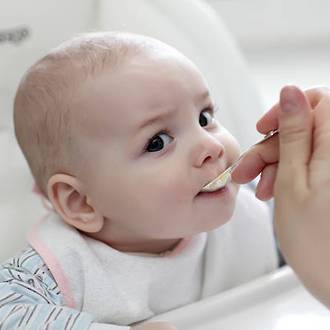Shop
01409
https://www.under5s.co.nz/shop/Hot+Topics+Articles/Food+%26+Eating/Starting+solids.html
Starting solids
|
Is your baby ready for solids? What signs do you need to look out for? Starting your baby on solid foods is a major (and very messy!) developmental milestone. Check out these handy tips.
|
You might also be interested in ...
Ideas for healthy kids drinks
We all know that sugary soft drinks are not good for our kids’ teeth, but what else can you give toddlers or preschoolers to drink other than milk or water? We take a look at some alternatives that are still healthy for kids but don’t have such a high sugar content.
Early eating habits
The hype around what we eat is nothing new with figures showing that a significant number of New Zealand kids are either overweight or obese. It is therefore important for us as parents and caregivers to encourage our children to eat healthily from a young age. Research provides clear evidence that the food habits and patterns children acquire in early childhood remain with them into adulthood.
join usJoin us on social media for all our latest news. |
sign upSign up and receive our latest newsletters. |
|







Starting your baby on solid foods is a major (and very messy!) developmental milestone.
It is recommended that solids are started between 4-6 months. However, it is more important to focus on the signs or readiness rather than the age of your baby.
If you give your baby solids too early you may increase the risk of digestive problems, food allergies or food intolerances.
Starting solids
5 Signs your baby is ready to start solids
1. They have an interest in food and watching others eat.
2. They have a growing appetite and still hungry, even with 6-8 breast or formula feeds per day.
3. The can sit up well when supported.
4. They have good head control. Babies need to be able to hold their heads steady by themselves before they can begin to eat.
5. The loss of their tongue-thrust reflex. They need to be able to move solid food to the back of his mouth to swallow it.
7 Tips on starting solids
1. Be prepared for mess! Especially if you're introducing baby-led weaning.
2. Choose a time to start when your baby is not too tired.
3. Start with offering them one meal per day, gradually increasing up to 3 meals per day.
4. Keep feeding time positive and fun. Your baby is learning a new skill. Being patient and calm helps your baby see that mealtimes are a fun relaxing time and helps to build a positive association with food.
5. Keep preserving! Quite often babies will have to try things several times before they will accept it.
6. It is important that breast milk or formula remains a big part of a baby's diet until 12 months. Both provide important vitamins, iron and protein in a form that your baby is use to digesting.
7. After 6 months of age, breast milk or formula alone cannot meet an infant’s energy requirements and stores of iron and zinc are likely to be depleted by this age. Therefore solid foods are an important addition to your baby's diet.
More food & feeding time articles to enjoy
- Guide to baby-lead weaning
- 15 immune boosting foods to help kids stay healthy
- The risks of eating hummus for babies & toddlers
Source: This article has been kindly written for us by Yum Yum Kids. Image source: Freeimages